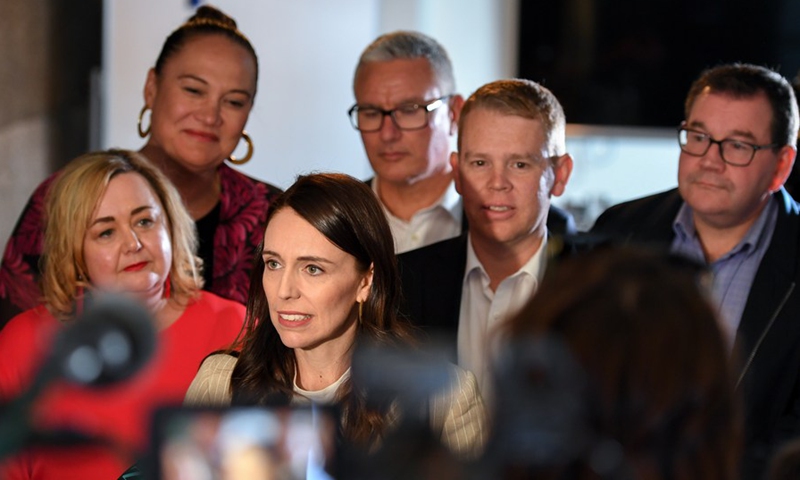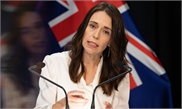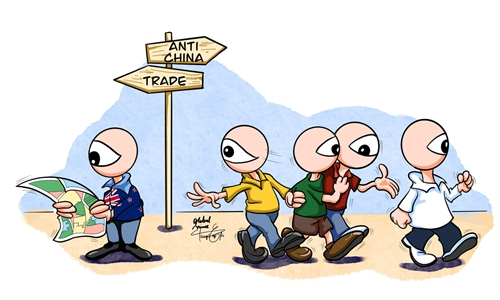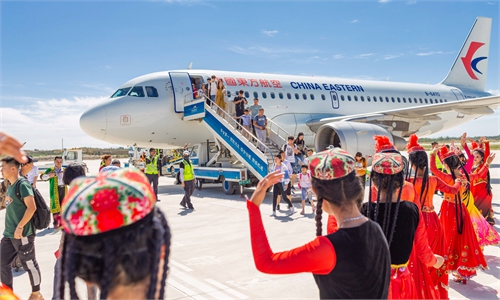
Labor Party leader Jacinda Ardern (front), the incumbent prime minister, addresses a press conference in Auckland, New Zealand, on Oct. 18, 2020. (Xinhua/Guo Lei)
The prime ministers of New Zealand and Australian, Jacinda Ardern and Scott Morrison, met in Queenstown on Sunday in their first in-person talks since COVID-19 closed borders in 2020, the Guardian reported on Sunday.Before the meeting, in a promo of the TV program 60 Minutes, an Australian version of the US television newsmagazine show 60 Minutes airing since 1979 on Sunday nights on the Nine Network, released on Thursday, Australian journalist Tom Steinfort asks Ardern if "you sometimes have to bite your tongue upsetting the regime in Beijing." She denies. The promo was mocked by NZ netizens and media. "Is Australian news coverage normally this dramatic?" asked Matthew Champion, executive editor for VICE World News.
However, as a matter of fact, such behavior by Australian media outlets is normal. These outlets, especially the right-wing ones, are supported by American bosses, who demand they cooperate with the US' anti-China campaign. As a result, it's quite unsurprising to see these outlets follow up - otherwise they won't get more funding.
Morrison's visit is also partly related to an American factor as Washington needs him to persuade Wellington to stand in line with the US' campaigns. In addition, Morrison needs to address the request to earn more support for his election campaign, which is facing challenges from far-right forces represented by Defense Chief Peter Dutton.
"These talks will be an important opportunity for us to continue our efforts to support an open, inclusive and resilient Indo-Pacific, where sovereign states can pursue their interests free from coercion," Morrison said before his visit to New Zealand. However, Canberra has always been the one coercing its neighbors, including Wellington, in the South Pacific region.
Coastal states in the region have been coerced and bullied by Australia in the spheres of politics, economy, culture, and military. In this regard, the South Pacific has never been an equal and inclusive region that is based on the rules of UN Charter and the Vienna Convention on Diplomatic Relations.
Australia has cozied up the US and managed to earn the label of "America's deputy sheriff" in the South Pacific in the early 2000s. But with smaller territory and weaker national strength, New Zealand has focused more on economic interests that determine its national welfare, people's livelihood and political stability, rather than seek regional hegemony.
However, Australia, as the "deputy sheriff," has failed to play its role perfectly in the South Pacific region. This obviously does not satisfy the US. As Wellington stays independent in foreign and security policy, Canberra is very discontent with it. It wants New Zealand to be consistent with it so that together they can complete the tasks from Washington. Therefore, Canberra has been exerting pressure on Wellington. The 60 Minutes program was just another attempt from Australia to use its media to pressure New Zealand, but it has caused an unexpected backlash that is huge across the small island country.
The Ardern administration is more peaceful and friendly amid the anti-China clamor in the US and some other Western countries. In fact, it has repeatedly demonstrated its political wisdom and sobriety. Apart from the fact that New Zealand's positioning and its priority of national interests is different from Australia, the composition and status of its people between the two countries are also different.
New Zealand's Maori people have a high political status in the country. They enjoy greater rights in the country's political life. But the majority of the Australian aboriginal population was driven into the reserves and treated unfairly. This has led to strong shades of colonialism, racism and hegemony in Australian politics.
Besides, there is serious competition between New Zealand and Australia's exports. As a result, New Zealand values its established markets and is unwilling to sacrifice its interests to US hegemony, nor can it afford to do so. By contrast, Australia relies heavily on the US for security and therefore is more subject to Washington.
But in any case, if China-US competition escalates, New Zealand will to some extent be influenced. After all, if the largest two countries in the world are engaged in total confrontation, no other country will have the ability to keep a neutral stance. At that time, everyone will be forced to take a side, especially the countries viewed as allies by the US.
In this context, Wellington prefers to keep the situation stable and prevent it from deteriorating into one where it will have to sacrifice its interests. This is why the NZ government has strived to stay independent and sober-headed.
The author is chief research fellow at the research center for Pacific island countries of Liaocheng University in East China's Shandong Province. opinion@globaltimes.com.cn



